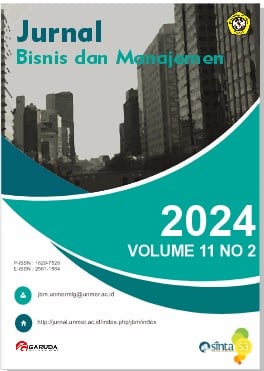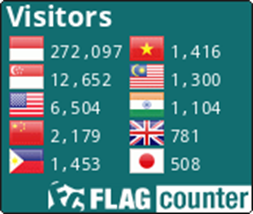The Role of Transformational Leadership in Enhancing Employee Creativity and Performance: A Social Cognitive Theory Perspective
Keywords:
Transformational Leadership, Employee Creativity, Employee PerformanceAbstract
The competitiveness of domestic technology is currently very high over time, which makes companies competitive with each other in increasing digitalization in the organization. Transformational leadership is crucial for companies to enhance employee creativity, especially for state-owned enterprises (SOEs) in the electric energy sector. The purpose of this study was to determine the effect of (1) Transformational leadership on employee creativity, (2) Transformational leadership on employee performance, and (3) Employee creativity on employee performance. The sampling technique used Proportional Random Sampling. The sample used was permanent employees of a state-owned enterprise in the electric energy sector located in Malang City, Indonesia, with 89 employees. Data were obtained from questionnaires. Data analysis techniques using descriptive statistical analysis and Structural Equation Modeling using the SmartPLS. The results showed that there was a significant effect of transformational leadership on employee creativity while transformational leadership on employee performance showed no significant effect. Besides that, employee creativity on employee performance showed a significant effect.
Downloads
References
Abdullah, Sri Muliati. (2019). Social Cognitive Theory: A Bandura Thought Review published in 1982-2012. Journal Psikodimensia, 18(1), 85-100. DOI 10.24167/psidium.v18i1.1708
Afza, R., Siregar, D. I., & Zaki, H. (2022). Analisis Pengaruh Kepemimpinan Transformasional dan Perilaku Kerja Inovatif Terhadap Kinerja Karyawan. (Development of Research Management): Jurnal Manajemen, 17(1).
Albrecht, S. L., Bakker, A. B., Gruman, J. A., Macey, W. H., & Saks, A. M. (2015). Employee engagement, human resource management practices, and competitive advantage: An integrated approach. Journal of organizational effectiveness: People and performance, 2(1), 7-35.
Bandura, A. (1986). Social foundations of thought and action: A social cognitive theory. Englewood Cliffs: Prentice Hall.
Bass, B. M., Avolio, B. J., Jung, D. I., & Berson, Y. (2003). Predicting unit performance by assessing transformational and transactional leadership. Journal of Applied Psychology, 88(2), 207.
Bernardin, H. J., & Joyce E. A. R. (2001). Human Resource Management. Singapore: McGraw-Hill Inc.
Bushra, F., Usman, A., & Naveed, A. (2011). Effect of transformational leadership on employees’ job satisfaction and organizational commitment in the banking sector of Lahore (Pakistan). International Journal of Business and Social Science, 2(18), 261-267.
Carlson, D. S., & Perrewe, P. L. (1995). Institutionalization of organizational ethics through transformational leadership. Journal of Business Ethics, 14, 829-838.
Ferdousi, F., & Abedin, N. (2023). Strategic Human Resources Management for Creating Shared Value in Social Business Organizations. Sustainability, 15(4), 3703.
Gibson, J., et al. (2006). Organization (Behavior, Structure, Proceses). Twelfth. Edition. Mc Grow Hill.
Gong, Y., Huang, JC, & Farh, JL (2009). Orientasi pembelajaran karyawan, kepemimpinan transformasional, dan kreativitas karyawan: Peran mediasi efikasi diri kreatif karyawan. Jurnal Akademi Manajemen, 52(4), 765-778.
Guilford J.P. (1959). Traits in creativity. In Anderson Harold H. (Ed.), Creativity and its, cultivation (Addresses Presented at the Interdisciplinary Symposia on Creativity, Michigan State University) (pp. 142–161). New York, NY: Harper & Brothers.
Hair, J., & Alamer, A. (2022). Partial Least Squares Structural Equation Modeling (PLS-SEM) in second language and education research: Guidelines using an applied example. Research Methods in Applied Linguistics, 1(3), 100027.
Harsoyo, R., & Alim, N. (2022). Subjek dan Karakteristik Kepemimpinan Transformasional dan Peran Strategisnya di Lembaga Pendidikan Islam. 8(2), 143–156.
Harsoyo, R. (2022). Teori Kepemimpinan Transformasional Bernard M. Bass dan Aplikasinya Dalam Peningkatan Mutu Lembaga Pendidikan Islam. Southeast Asian Journal of Islamic Education Management, 3(2), 247-262. http://sajiem.iainponorogo.ac.id/sajiem
Hassan, M. U., Malik, A. A., Hasnain, A., Faiz, M. F., & Abbas, J. (2013). Measuring employee creativity and its impact on organization innovation capability and performance in the banking sector of Pakistan. World Applied Sciences Journal, 24(7), 949–959. https://doi.org/10.5829/idosi.wasj.2013.24.07.13253
Insani, A. N., Manajemen, P., & Ekonomi, F. (n.d.). Pengaruh Gaya Kepemimpinan Transformasional dan Motivasi Kerja Terhadap Kinerja Karyawan. 1127–1133.
Ismail, H. N., Iqbal, A., & Nasr, L. (2019). Employee Engagement and Job Performance In Lebanon: The Mediating Role of Creativity. International Journal of Productivity and Performance Management, 68(3), pp. 506-523. https://doi.org/10.1108/IJPPM-02-2018-0052
Jean Jr., C. V. L., & Ferinia, R. (2023). Kreativitas Karyawan sebagai Variabel Mediasi antara Motivasi dan Kinerja Karyawan. Jurnal Perspektif, 21(1), 79–89. https://doi.org/10.31294/jp.v21i1.15520
Kim, S. L. (2019). The interaction effects of proactive personality and empowering leadership and close monitoring behaviour on creativity. Creativity and Innovation Management, 28(2), 230–239.
Lee, L. Y., & Tan, E. (2012). The influences of antecedents on employee creativity and employee performances: A meta-analytic review. Interdisciplinary Journal of Contemporary Research in Business, 4(2), 984-996.
Lo, P., Allard, B., Anghelescu, H. G. B., Xin, Y., Chiu, D. K. W., & Stark, A. J. (2020). Transformational leadership practice in the world’s leading academic libraries. Journal of Librarianship and Information Science, 52(4), 972–999. https://doi.org/10.1177/0961000619897991
Muchson, M. (2017). Statistik Description. Bogor: Guepedia.
Novitasari & Asbari. (2020). Pengaruh Kepemimpinan Transformasional Terhadap Kinerja Karyawan: Peran Kesiapan Untuk Berubah Sebagai Mediator. Jurnal Manajemen, 10 (2). https://doi.org/10.30656/jm.v10i2.2371
Rivai, A. (2020). Pengaruh Kepemimpinan Transformasional dan Budaya Organisasi Terhadap Kinerja Karyawan, 3(2), 2623-2634. http://jurnal.umsu.ac.id/index.php/MANEGGIO
Sari, N. I. A. (2019). Pengaruh Kepemimpinan Transformasional terhadap Kreativitas Karyawan melalui Self Effiacy sebagai Variabel Mediasi. (Skripsi Sarjana, Universitas Muhammadiyah Yogyakarta). http://repository.umy.ac.id/handle/123456789/27618
Shafi, M, Zoya, dst. (2019). The effects of transformational leadership on employee creativity: The moderating role of intrinsic motivation. Asia Pacific Management Review. 1029-3132. https://doi.org/10.1016/j.apmrv.2019.12.002
Shin, S. J., & Zhou, J. (2003). Transformational leadership, conservation, and creativity: Evidence from Korea. Academy of Management Journal, 46(6), 703–714
Sosik, J. J., Kahai, S. S., & Avolio, B. J. (1998). Transformational leadership and dimensions of creativity: Motivating idea generation in computer-mediated groups. Creativity Research Journal, 11(2), 111–121. https://doi.org/10.1207/s15326934crj1102_3
Sudjijana, M. Y. S. (2020). Pengaruh kepemimpinan transformasional, iklim inovasi, efikasi diri terhadap kreativitas karyawan pada industri pembuatan gerabah di desa Kasongan, Kabupaten Bantul. Jurnal Ekobis Dewantara, 2(3).
Teymournejad, K., & Elghaei, R. (2017). Effect of transformational leadership on the creativity of employees: An empirical investigation. Engineering, Technology & Applied Science Research, 7(1), 1413-1419.
Williams, L. J., & Anderson, S. E. (1991). Job Satisfaction. Journal of Management, 17(3), 601–617.
Yukl, G. (1999). An Evaluation of Conceptual Weaknesses in Transformational and Charismatic Leadership Theories. Leadership Quarterly, 10, 285-305.
Downloads
Published
How to Cite
Issue
Section
License
Authors who publish with this journal agree to the following terms:
(1) Copyright of the published articles will be transferred to the journal as the publisher of the manuscripts. Therefore, the author confirms that the copyright has been managed by the journal.
(2) Publisher of Jurnal Bisnis dan Manajemen is University of Merdeka Malang.
(3) The copyright follows Creative Commons Attribution–ShareAlike License (CC BY SA): This license allows to Share — copy and redistribute the material in any medium or format, Adapt — remix, transform, and build upon the material, for any purpose, even commercially.














